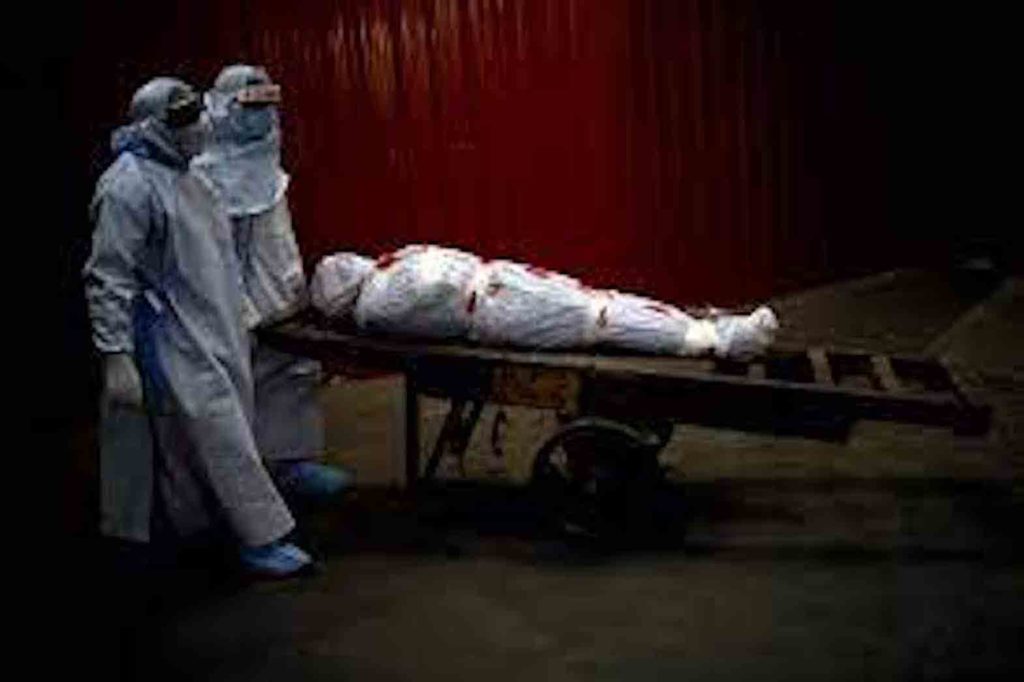
Health workers carry the body of a man who died due to the coronavirus disease (COVID-19) for his cremation at a crematorium in New Delhi, India, June 4, 2020. REUTERS/Adnan Abidi/File Photo
In their old age and in death, my parents were never a burden, and every single day with them was purest joy. Oh, I tell you, it was so easy to make them smile and those smiles linger among us siblings. When we remember those sweet smiles during this time of the year, talking stops and tears just roll down the cheeks.
We miss caressing our parent’s wrinkled hands, hugging their frail bodies, and kissing their foreheads. My dad and mom’s scheduled meetings with their Creator were quick as if to spare us living from worries.
Apple CEO, the late Steve Jobs – whom we fondly remember giving us iPod, iPhone, and iPad, iMac, iTunes, Apple Retail Stores, iTunes Store, and App Store, and a million other fantastic ideas – said in his Commencement Address at Stanford University in 2005 that, “No one wants to die. Even people who want to go to heaven don’t want to die to get there.”
Then he added words pertinent to something mysterious (mysterious as definitive but uncertain) that strikes us as quite fearful, or even terrifying for some: “And yet death is the destination we all share. No one has ever escaped it.”
You wonder why death has all this time remained mysterious? I remember that, in my studies of Oriental Philosophy, if I may share, the old Chinese beliefs profess a sort of skepticism about the afterlife, which for them was the most impenetrable secret of all secrets. 死, SI, the simplified Chinese character which means “death” appeared only 38 times in the Analects.
Over 2,000 years ago, when a disciple Chi Lu ventured to ask about death, the venerable sage Confucius’ answer was revealing: “While you do not know life, how can you [hope to] know about death?” And we are told that the master reprimanded his disciple.
Although the ruler of Communist China Mao Zedong (1893-1976) is thought to have told his comrades, “First do not fear hardship, second do not fear death,” our multicultural Chinese brethren, even the contemporary ones, have always avoided the question of death and dying. Of course, we see them keep photos of their beloved dead in a small altar at home, due to filial piety, they prefer instead to be more pragmatic, speaking more about the present and less of the afterlife.
Call it pragmaticism or whatnot, living a good life and enjoying the here and now is what they do best, considering that the Confucian view of life is one of “life and life” and not “life and death.” Meanwhile, extremely pragmatic people in various corners of the globe live the down-to-earth philosophical maxim: “Eat, drink and be merry, for tomorrow you shall die.”
There’s a deep sense of desolation every time someone has to be “reunited with his forebears” (Genesis 42:29). The ancient Jews of the Old Testament felt it so much, as they meditated that the dead “were no more” since the dead “went away into non-existence” (Psalms 39:14; Job 7:8).
For the Jews, Sheol is the place of the dead, conceived as a gaping hole, a deep pit, an abode of complete silence (Psalms 115:17), of total darkness and oblivion (Psalms 88:12f; Job 17:13), where hope was out-and-out gone. I guess such a description may now be characterized as a universal experience after Covid-19. Because death is unknown and uncertain, it is quite terrifying for some. Or death, as the actor Hugh Jackman has described it, is like Covid-19, a disease with no cure.
What happens after death normally escapes the grasp of the living! Even among the youth of the new millennium, there is almost an absolute lack of knowledge of what happens beyond the grave and the afterlife is just beyond one’s power to understand. It’s up there and about, yes, but lurking with conundrum.
Like what Steve Job believed, death is certain and inevitable. Even though you do not wait for it, it arrives and arrives in time, without delay.
For us Christians, death and dying involve the whole person. It may seem that one important dimension of the usually-sad-or-tragic event involves the “I,” where the “I” stands for the whole human person.
We cannot understand fully why death for many saints is beautiful. As St. Therese of Lisieux intimated in The Last Conversations that in death it is not only the human soul that goes out to meet the living God. It is the whole person. Wrote the saint who died at 24, “I am not dying; I am entering life.”
Thus, it is not only the body that dies or only the soul that enters eternal life, thus making death and dying experiences of the complete “I.” I live and I die, and I live with God after my death seem to me a confirmation of what Abraham Lincoln once said, “Man was made for immortality”
Finally, this is what makes us different from our Chinese, Jewish, and other brethren: Death is not the end of everything.
The Christian meaning of death is its transformation from curse into a blessing, assuring us that the nature of death which can reduce man into utter helplessness (curse) has been transformed by Christ our Savior into something beautiful (blessing) when He himself was crucified and breathed his last.
BTW, etymologically, Halloween comes from the old English word “hallow,” as in “Hallow be Thy Name” in the ancient version of the Our Father. So Halloween stands for holy persons, and not for strange, scary, alien-looking ghosts.
Happy All Saints and All Souls Day!
Jose Mario Bautista Maximiano is the author of the book The Beginning and The End: A Theology of the Human Person (Claretian, 2016).

